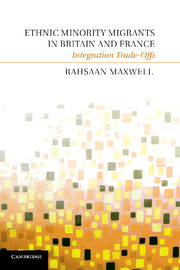
- Publisher:
- Cambridge University Press
- Online publication date:
- April 2012
- Print publication year:
- 2012
- Online ISBN:
- 9780511792427

This book addresses why some ethnic minority migrant groups have better economic and political integration outcomes than others. The central claim is that social integration leads to trade-offs with economic and political integration. The logic behind this claim is that socially segregated groups may have difficulties interacting with mainstream society but will have more capacity for group mobilization. That mobilization can improve economic and political integration. In comparison, socially integrated groups may have greater capacity to interact with mainstream society but also less likelihood of developing significant group mobilization resources. As a result, this can limit their economic and political integration outcomes. Rahsaan Maxwell develops this argument with evidence from Britain and France, claiming that similar group-level dynamics exist despite numerous national-level contextual differences, and provides a brief extension of the argument to The Netherlands and the United States.
“No consensus exists on the most effective and normatively desirable modes of integration of migrant ethnic minorities. Maxwell contributes significantly to clarifying the issues at stake. He proceeds from the simple but useful observation that integration is multidimensional and that there are trade-offs between different dimensions of integration, especially between social integration and political and economic integration. The key intervening variable is group mobilization. The exposition is data rich, drawing on a large number of interviews. It is also broadly comparative, as Maxwell analyzes state level as well as community level outcomes and devotes a chapter to the Netherlands and the US.”—Gary P. Freeman, University of Texas, Austin
“Rahsaan Maxwell sets out to explain differences in incorporation outcomes between immigrants in Britain and France from the Caribbean, South Asia, and Maghreb. His in-depth research provides an unparalleled study of the impact of levels of social incorporation on political and economic outcomes for immigrant communities. Immigrant integration is a very important issue across Europe, and Maxwell’s research provides a sound basis for understanding differences in outcomes and how policy makers can approach these issues in an effective manner.”—Terri Givens, University of Texas, Austin
“As individuals, we want to believe that good things come in packages; as scholars, we are often more interested in trajectories than in tradeoffs. But Rahsaan Maxwell's powerful new book forces us to engage with how, and why, immigrant incorporation can fail in some arenas while succeeding in others. The framework is elegant, the evidence effectively compares across countries and groups, and the message is sobering as well as clarifying. This is a really innovative and important analysis.”—Jennifer Hochschild, Harvard University
“In his very smart book, Rahsaan Maxwell demonstrates the disconnections between social integration and economic and political integration. These are extremely important issues and although he focuses on France and the UK, his findings concern all developed democracies. His work on France is particularly groundbreaking, given the sensitivity of ethnic issues in the country. Furthermore, his ability to assess discrimination in France in multiple ways that do not require ethnic statistics is highly commendable. Rahsaan Maxwell is one of the most promising scholars of his generation.”—Patrick Weil, Centre National de la Recherche Scientifique; Université Paris 1 Panthéon-Sorbonne
 Loading metrics...
Loading metrics...
* Views captured on Cambridge Core between #date#. This data will be updated every 24 hours.
Usage data cannot currently be displayed.